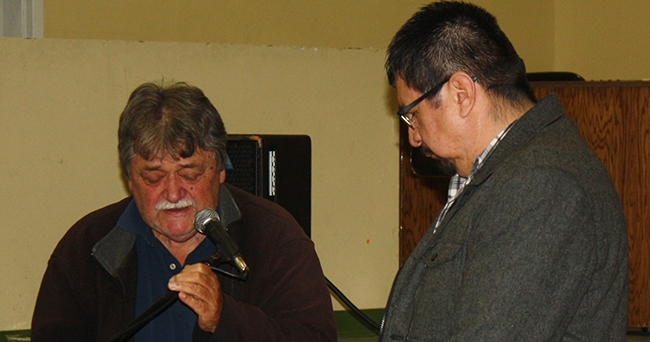NSTC unveils MedicAlert pilot program for FASD victims: help is on the way

By Leslie Knibbs
Willard Pine, an elder from Wikwemikong gave an opening prayer at a recent FASD conference then told those attending, he’s lived and worked with this disorder all of his life. Pine spoke sadly of affected children being called “stupid and dumb” because the person or persons dealing with them saw what they considered inappropriate behavior not knowing the child or adult suffered from FASD. Not being able to recognize this disorder exasperates problems faced by both the victim and those confronting it. With a new pilot project involving First Nations and Inuit people afflicted with FASD and the MedicAlert Foundation, help is on the way for affected individuals, caregivers, teachers, police, and other stakeholders.
On November 13, the NSTC put on its 6th Annual FASD Conference at Serpent River First Nation unveiling a pilot program linking FASD affected First Nation and Inuit individuals with the MedicAlert foundation for support. This is the first program of its kind in Canada. If successful, stakeholders like Stefanie Reinoso-Tan, manager with MedicAlert and Pricsilla Southwind from N’Mninoeyaa (Aboriginal Health Access Centre) are hopeful others will adapt this model and take the program Canada wide.
FASD is referred to as a ‘hidden disability’ which negatively affects an individual’s behavior with diminished brain functions including academic skills, focus, communication, memory, executive functioning, sensory skills, social skills and cognitive skills such as thinking and reasoning; all of which lead to challenges for affected people, both victims and those dealing with them . Through no fault of their own, those affected have been dealt a bad hand and must deal with it for life. There is no cure. There is prevention however, a mother should not consume alcohol during pregnancy as this causes FASD. According to the ‘Canadian Addictions’ survey, 76% of women surveyed drank alcohol in the past year, 50% of pregnancies are unplanned and “most women don’t know they are pregnant until six weeks or more into their pregnancy.”
Recognition of FASD victims is being made easier with the start of this Medic Alert program by identifying those affected. In early 2014, Priscilla Southwind, a resident of Sagamok Anishniwabek First Nation and former co-ordinator of the North Shore Tribal Council FASD program was approached by Medic Alert regarding running a possible pilot program to benefit individuals with FASD. One of the most glaring missteps is with the Criminal Justice system’s lack of knowledge on FASD and how to recognize individuals in court who are affected by it.
Following several meetings, the pilot program was approved and supported by Anishniwabek Police Services and Algoma Emergency Response Services. With the establishment of this program, both police and EMS are fast becoming more aware of how to deal with and interact with those afflicted with FASD resulting in improved relations for all concerned. A high percentage of those with FASD or a probable diagnosis of FASD, end up in courts, jail, or prison, oftentimes admitting to being responsible for a crime they had not committed.
Subsequent to a survey completed in 2008 of Judges and Prosecutors it was learned that most information they had on FASD was from major media like television and news reports. Findings in a 2008 survey on FASD and the Criminal Justice System funded by ‘Crime Prevention Canada’ pointed to the need for specific action to improve the ability of Judges and Prosecutors to recognize and to work with people affected by FASD in the Criminal Justice System.
The NSTC pilot program will extend from north of Sault Ste. Marie to Parry Sound and all points in between, including all First Nations. Anishniwabek Police are reaching out to other police services and promoting the pilot to all members.
Keynote speaker at the conference was Diane Malbin, M.S.W. from Oregon; Malbin is the founder of FASCETS (Fetal Alcohol Syndrome Consultation, Education and Training Services, Inc.), a non-profit, with a mission is to provide training, program adaptation and implementations for people with FASD, parents, and professionals dealing with affected individuals. Malbin brings a lot of knowledge and personal experience to this field from raising two children with FASD.
Speaking to those attending, Malbin stressed it is important for those dealing with an affected individual to adjust expectations and make adjustments when interacting with a person with FASD. She pointed out telling an person affected to “act their age” is inappropriate and ineffective; but rather it is best to go to their level and adjust expectations accordingly. Suggesting an FASD affected person is doing something wrong as a result of their behaviour is unproductive and in fact punishing them which only leads to anxiety and anger in the individual said Malbin. Without a diagnosis and recognition, it is difficult to determine if an individual has FASD thereby difficulties for the victim and others are increased.
Objectives for the pilot program are: “to provide persons afflicted with FASD with a specific MedicAlert ID (silver reflective sports band) which will identify the person to emergency responders as having a confirmed or probable diagnosis of FASD, to educate and raise awareness among emergency responders (police and EMS) about FASD and how to best approach the individual with FASD, to determine whether having identified the individual in the emergency scenario as having FASD will result in more equitable treatment.”
According to Medic Alert and the North Shore Tribal Council FASD co-ordinator , “the decision to continue pilot, scale-up or proceed to phase 2, will be made in November 2016, depending on results gathered from the 1-year pilot.”
Having worked diligently with a firmly entrenched dedication to caring for individuals afflicted with FASD, Priscilla Southwind and her associates on the North Shore Tribal Council continue to move forward with this giant step in their ongoing efforts to educate and assist those living with FASD.


